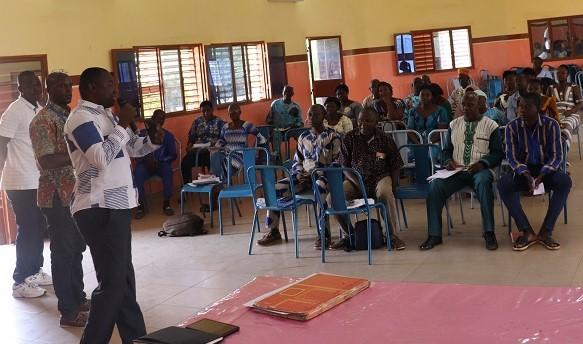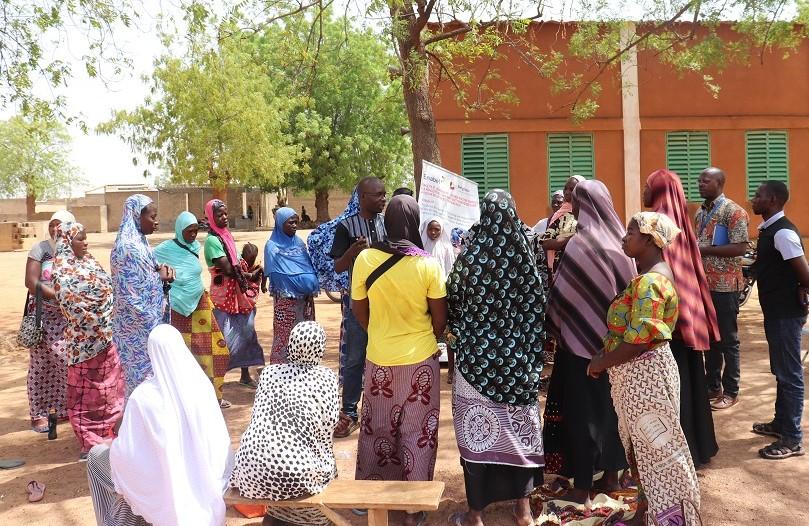Search
Viewing 1185 to 1200 of 3126 news
-
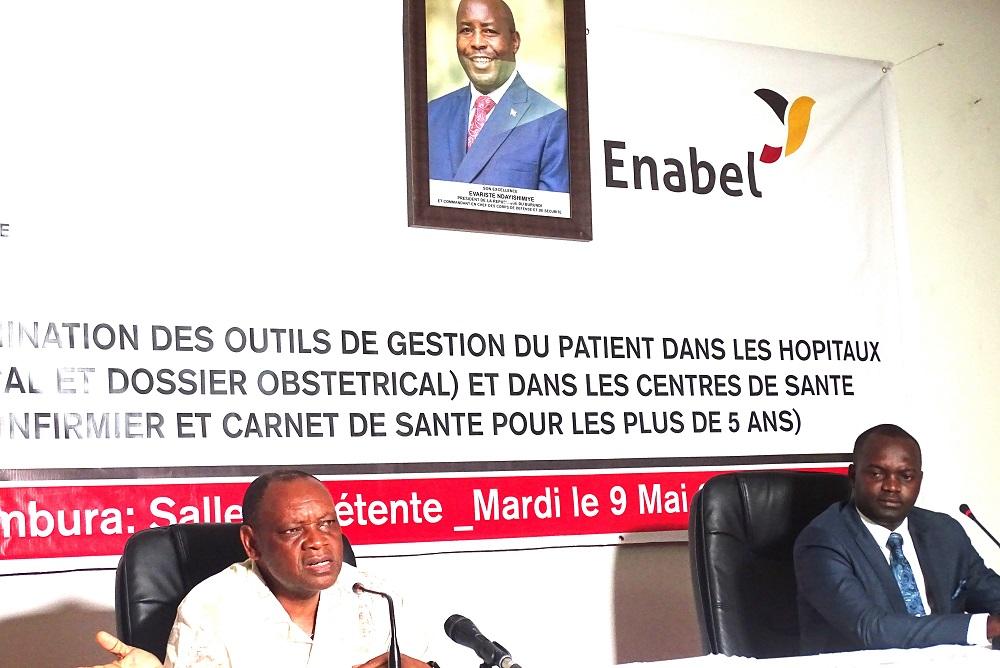
Burundi : Diffusion des outils de gestion pour améliorer la qualité des soins et services de santé
Jean BIRONKWA | 19/05/2023
Le Ministère de la santé Publique et de la lutte contre le Sida en partenariat avec Enabel à travers le projet d’appui au système national d’information sanitaire a organisé à Bujumbura un atelier de diffusion des outils de gestion des patients dans les formations sanitaires. Cette rencontre qui a été organisée à Bujumbura le 09/05/2023 a réuni près de 200 prestataires des différents niveaux du système de santé au Burundi. Il s’agit des cadres du niveau central du MSPLS, les représentants des bureaux provinciaux de la santé, ceux des bureaux de districts sanitaires et les représentants des formations sanitaires du pays. Cette rencontre de diffusion des outils avait pour objectif de contribuer à l’amélioration de la qualité des soins et services de santé dans les FOSA avec des outils standardisés répondant au mieux aux prestations offertes aux patients. Ces nouveaux outils standardisés sont composés du dossier médical et obstétrical au niveau des hôpitaux et du dossier infirmier et carnet de santé au niveau des centres de santé. Les applications informatiques utilisées au niveau des hôpitaux et centres pour la gestion du dossier médical électronique devront être adaptées conformément aux nouveaux outils disséminés. Selon le Directeur Général de la planification qui a représenté le Ministère de la santé Publique et de la lutte contre le Sida, cet atelier est d’une importance capitale car la dernière version des outils en cours d’utilisation datait de 2014 et n’était plus en adéquation avec la qualité des soins. « Les outils de gestion des patients sont des éléments importants pour garantir une offre de soins de qualité aux patients. Ils facilitent le diagnostic rapide des patients mais aussi permet de connaitre facilement les antécédents du malade. C’est un moyen aussi important pour bien assurer une gestion efficace des ressources financières et matérielles des formations sanitaires. La qualité des soins est conditionnée par la maitrise parfaite de l’usage de ces outils par les différents intervenants. Nous en profitons pour remercier nos partenaires dont Enabel qui a accompagné tout le processus d’harmonisation de ces outils. Au MSPLS, nous sommes conscients que la bonne santé de la population burundaise est le premier facteur du développement économique car une population en bonne santé va s’atteler aux travaux de développement du pays », a rappelé le Directeur Général de la Planification au Mspls , Dr Polycarpe Ndayikeza . Dr Etienne Mugisho qui a représenté Enabel a rappelé l’engagement de l’Agence Belge de Développement pour appuyer le Ministère de la santé dans ses efforts d’améliorer l’accès aux soins et services de santé de qualité pour la population burundaise. Il a souligné qu’Enabel accompagne le grand chantier de la digitalisation du système de santé du Burundi depuis plusieurs années. Jusqu’à la fin 2023 et début 2024, 50 hôpitaux publics et confessionnels et 35 centres de santé auront un dossier médical digitalisé. 72% de ces hôpitaux ont été appuyés par Enabel et tous les centres de santé sont soit sur financement du Royaume de Belgique soit sur celui de l’Union Européenne.
-
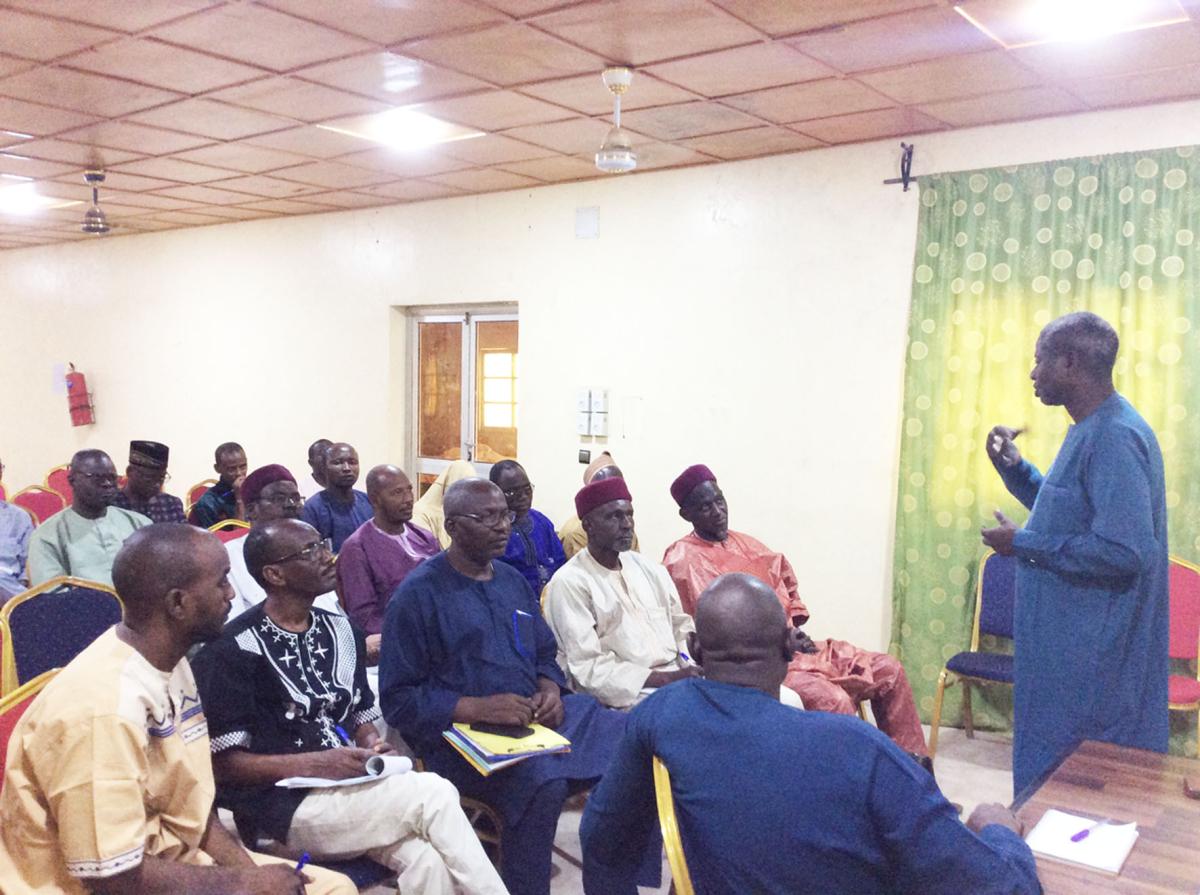
Au Niger, réflexions sur le mécanisme de suivi des travaux de restauration des terres dégradées
Halissa HASSAN DAN AZOUMI | 18/05/2023
Le portefeuille thématique Climat – Volet Niger a organisé, à Doutchi dans la région de Dosso, un atelier de réflexion sur les modalités de suivi des travaux de restauration des terres.L’atelier a retenu la mise en place d’une commission communale de vérification des travaux et leur validation par le Directeur Départementale de l’Environnement avant de procéder au paiement des prestataires et des travailleurs communautaires. Cela permettra d’avoir des ouvrages de bonne qualité, pour une meilleure régénération de la biodiversité végétale et animales et la lutte contre les changements climatiques. Notons que le portefeuille thématique Climat- Volet Niger ambitionne de travailler sur la problématique de la dégradation des terres et des ressources en eau, par des actions visant aussi bien les causes directes (pratiques agropastorales, exploitation du bois-énergie, gestion des ressources en eau, etc.) que les causes sous-jacentes (aménagement du territoire, insécurité foncière, pauvreté) dans 11 communes d’intervention situées à cheval sur les régions de Dosso et Tahoua, dans les départements de Loga, Doutchi et Konni.
-
Au Burkina Faso, Enabel appuie la mise en œuvre d’activités d’éducation en situation d’urgence
Kimsegninga SAVADOGO | 17/05/2023
En réponse à la situation d’insécurité dans la région du Centre-Est qui a contraint environ 288 établissements à fermer les portes et à plus de 46 000 élèves d’abandonner les bancs (données du Secrétariat technique de l’Education en Situation d’Urgence), l’Agence belge de développement Enabel appuie l’Association Tin Tua (ATT) , dans la mise en œuvre d’activités d’éducation en situation d’urgence dans cette région. Cet appui vise l’amélioration de l’accès des enfants d’âge scolaire (6-17 ans) déplacés, à une éducation inclusive de qualité dans un environnement sûr et protecteur. Dans le cadre de cette intervention, il a été initié une série de sessions de formation pour renforcer la capacité des enseignants et autres acteurs de l’enseignement sur la promotion de l’éducation à la paix en milieu scolaire. Dans la province du Kouritenga qui accueille beaucoup d’élèves déplacés internes du fait de l’insécurité que vit le Burkina Faso, lorsque ceux-ci arrivent, les enseignants n’ont pas assez de connaissances et de compétences pour se comporter envers eux et pour les aider à s’insérer sur le plan social. Synergie d’action entre Tin Tua et Enabel pour un secteur éducatif résilientC’est pourquoi le consortium Tin Tua et Enfants du Monde, avec l’accompagnement d’Enabel au Burkina Faso, accompagnent les acteurs scolaires pour l’élaboration et la réalisation de modules de formation en vue de permettre aux établissements de pouvoir traverser la crise sécuritaire avec moins de problèmesEnabel et son partenaire Tin Tua ont manifesté leur volonté d’accompagner le secteur éducatif au Burkina Faso qui connait en ce moment des difficultés d’ordre sécuritaire. Ils ont voulu renforcer les compétences des acteurs de l’éducation sur plusieurs thématiques afin de leur permettre de demeurer résilients et aptes à affronter la situation délétère et de fragilité causée par l’insécurité. Une série de quatre sessions de formation a été déroulée. Ces sessions ont été consacrées à la protection de l’enfant, le « safe school », le danger des mines et l’éducation à la paix, des thématiques jugés pertinentes par les bénéficiaires qui estiment que tout le travail des acteurs de l’éducation consiste à amener les élèves, les autres acteurs et partenaires à cultiver le « vivre ensemble ». Car disent-ils, « il est difficile d’avoir un climat sécurisé propice à l’éducation des enfants du pays si entre acteurs et partenaires, il existe des difficultés de compréhension et tout ordre ». Des formations qui donnent des rudiments pour mieux faire face à la situation d’insécurité Environ 800 enseignants, chefs d’établissements, élèves et parents d’élèves ont bénéficié de la série de formation qui vise à outiller les acteurs et les partenaires de l’éducation en connaissances afin qu’ils puissent s’accepter mutuellement et savoir comment faire pour assurer la continuité de l’activité d’éducative malgré les conditions difficiles liées à l’insécurité.Pour M. Dieudonné BELEMSIGRI directeur provincial des enseignement primaires et post-primaires de la province du Kouritenga qui s’appuie sur la qualité des échanges au cours des sessions de formation, l’exercice répond à un besoin réel des acteurs de terrain. Encore selon lui, il arrive que des acteurs ou des partenaires en l’occurrence les partenaires sociaux comme les associations de parents d’élèves (APE) qui veulent parfois se donner à fond à l’éducation mais il leur manque les connaissances face à la situation actuelle auquel le monde éducatif burkinabè est confronté. La formation dispensée permet de leur donner la bonne information pour les aider à mieux connaître les contraintes liées à l’école et son environnement en vue de pouvoir à leur tour épauler efficacement les acteurs directs de l’éducation. Il en est de même pour les enseignants et les chefs d’établissement qui ne savent toujours comment se comporter face à la situation d’insécurité chronique et son lot de conséquences sur le système éducatif. Ces formations leur donnent des rudiments pour pouvoir mieux se comporter face à une situation d’insécurité tout comme elles les aide à mieux accueillir et à mieux accepter les élèves déplacés internes qui viennent des zones à fort défis sécuritaire. Un·e enseignant·e qui est formé·e est un·e démultiplicateur·trice de connaissance pour les autres et lors des conseils d’enseignement, les 800 enseignant·es formé·es entendent partager les connaissances reçues avec le reste du personnel enseignant de la zone afin qu’ensemble, ils·elles puissent impacter positivement leur environnement scolaire. Focus sur la recherche de la paix Les modules d’enseignement développés par Tin Tua/Enfants du Monde en collaboration avec Enabel, se rapportent à la thématique « paix en milieu scolaire ». Il s’agit de modules qui prônent la sensibilisation et l’information dans le domaine de la paix ainsi que son fondement pour aider les acteurs de l’enseignement à se focaliser sur le travail, la compréhension et le succès basés sur la paix. La région du Centre-Est est touchée par le phénomène d’insécurité et il était indiqué d’amener les acteurs scolaires à s’informer par exemple sur la nocivité des mines. Comment ces mines peuvent être traités, comment sauver des vies face à ces mines et comment éviter les travers ou les conséquences de ces mines ? Les bénéficiaires des sessions de formation ont pu s’enquérir de la notion d’éducation en situation d’urgence. Ce module a été développé pour permettre aux acteurs de mieux s’organiser pour permettre à tous ceux et celles qui n’ont plus de structures scolaires actuellement de pouvoir bénéficier d’encadrement et à ne pas rester sur le banc de touche tout simplement parce des établissements scolaires de certaines zones sont inaccessibles du fait de l’insécurité. Le thème sur la violence a aussi été développé pour permettre aux uns et aux autres de travailler pour le retour de la paix dans le pays. Beaucoup d’enseignants bénéficiaires de la formation se disent comblés parce que les modules développés ont apporté une plus-value à leurs capacités de résilience et cela se répercutera positivement selon eux, sur la qualité de la formation de leurs élèves. De l’avis de M. Seydou KABORE proviseur du lycée Kourita de Koupéla, coordonnateur des enseignants de l’enseignement post-primaire et secondaire de la province du Kouritenga, certains élèves se retrouveraient toujours sur le carreau ou dans la nature et grossiraient même le rang des terroristes, sans cette formation. « La formation nous permet d’œuvrer ensemble pour la consolidation de la concorde, de la stabilité et de la paix dans notre milieu de vie et de travail ». « Chaque acteur qu’il soit enseignant, élève ou parent d’élève, chacun a sa part de responsabilité dans la quête d’un retour à la paix et la stabilité. Si tout le monde est sensibilisé dans ce sens, nous pourront parvenir à plus de compréhension et à un mieux-être », dira-t-il tout en espérant pouvoir réinvestir les connaissances acquises au profit des élèves des différents établissements scolaires dans lesquels il intervient.
-
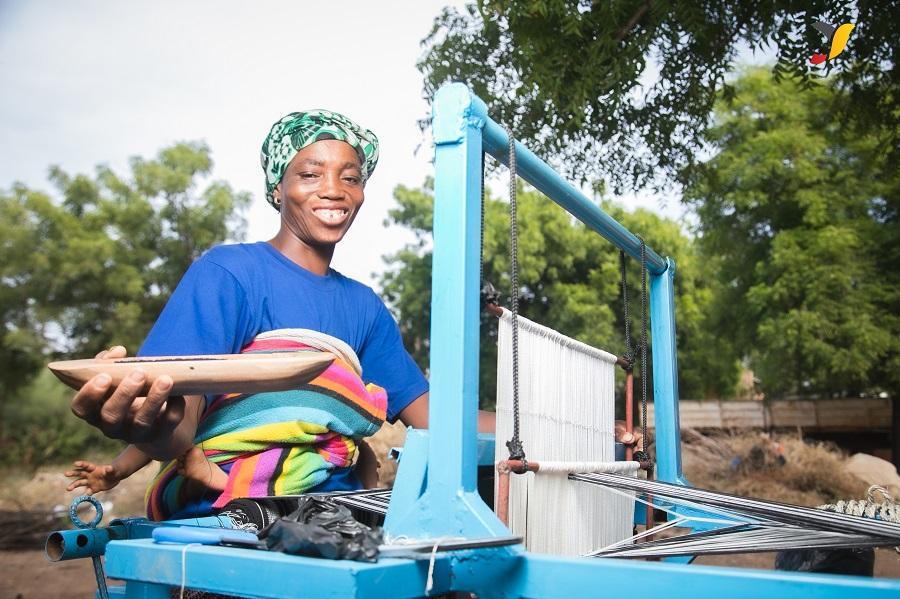
Burkina Faso: l'heure du bilan pour le micro-projet de réinsertion socio-économique des victimes de violences basées sur le genre
Kimsegninga SAVADOGO | 17/05/2023
Enabel au Burkina Faso, à travers son intervention « Santé et Droits sexuels et Reproductifs » (SDSR), a apporté un appui technique et financier à l’Organisation Catholique pour le Développement Economique et Social (OCADES) – Koupéla pour la mise en œuvre d’un micro-projet contribuant à la réinsertion socio-économique des survivant·es de Violences Basées sur le Genre (VBG) et l’autonomisation économique des familles d’accueil dans la région du Centre Est. Pour capitaliser les leçons apprises de la mise en œuvre de ce micro-projet et formuler des recommandations dans la perspective de pouvoir dupliquer et renforcer le modèle de prévention et de prise en charge des victim·es de VBG, SDSR et OCADES ont organisé le 11 mai 2023, à Koupéla dans la région du Centre-Est, un atelier bilan. Il s’est agi de donner une visibilité des actions menées sur le terrain et partager les expériences et acquis. Des appuis multiformes pour entreprendre des activités génératrices de revenus Les survivantes et familles accompagnées se sont lancées dans diverses activités génératrices de revenus (AGR) dont l’élevage de petits ruminants, de porcs et de volailles, le tissage, le petit commerce, la couture, la coiffure, la restauration, etc. Ce micro-projet fait suite à un investissement identique qui a permis l’élaboration d’un référentiel pour accompagner les acteurs impliqués dans la prise en charge des survivant·es de VBG. Lors de cette première étape, une dizaine de famille d’accueil et 50 survivant·es de VBG avaient bénéficié d’un appui pour leur autonomisation et plusieurs parties prenantes ont bénéficié de sessions de renforcement de capacités sur le guide d’orientation élaboré. C’est à travers cette expérience qu’un modèle d’autonomisation économique de ces bénéficiaires a été conçu et expérimenté par OCADES. Les survivantes de VBG ainsi que les familles d’accueil, ont bénéficié en plus, avec ce modèle, d’un coaching, des formations diverses comme les plans d’affaires, ont été connectés aux marchés et aux microfinances, ont été encadrées à travers les VSLA (Associations villageoises d’épargne et de crédit) et ont continuellement été suivies pour s’assurer de la viabilité de leurs investissements. Ce micro-projet est venu confirmer la particularité et l’adéquation du modèle de réinsertion socioéconomique, qui fait partie intégrante du modèle de prévention et de prise en charge des survivantes de VBG, développé par le programme SDSR et ses partenaires dans la région du Centre Est. Des témoignages de quelques bénéficiaires du projet Mme Adjara SANDWIDI de Tenkodogo : « Nous étions complètement démunies et exposées à toutes sortes de souffrances. Aujourd’hui, chacune de nous peut s’acheter du savon pour la lessive, faire moudre ses céréales au moulin. On nous a appuyé pour des activités d’élevage. Nous pouvons prélever nos produits d’élevage que nous pouvons vendre afin de satisfaire nos besoins en produits de consommation ». Mme Catherine KABORE de Pouytenga : « Il y a de cela deux années que j’ai bénéficié de 30 jours de formation sur le tissage. J’ai pu tirer d’énorme profit du métier de tisserand que j’ai appris. Le tissage me permet de gagner de l’argent et de m’acheter des condiments et des céréales pour l’alimentation de moi-même et de mes enfants. La clientèle apprécie mes produits de tissage. Je reçois des commandes lors des mariages et des baptêmes. L’année passée, il y a eu une cérémonie d’ordination à Kaya et j’ai exécuté une commande qui m’a permis de gagner un bénéfice de plus de deux cent mille (200 000) francs CFA. Enabel et OCADES nous apportent un appui constant. Cette année encore, nous avons bénéficié d’une formation en teinture. Avant, nous achetions les files et nous les faisions teindre par des teinturiers. Cela engendrait des coûts supplémentaires et nos marges bénéficiaires n’étaient pas tellement élevées. Maintenant que nous savons teindre nous-mêmes, nos marges bénéficiaires sont devenues plus importantes. Je me procure actuellement des revenus dans le domaine du tissage et de celui de la teinture. Cela fait neuf années que mon mari m’a quitté pour une aventure en Côte d’Ivoire et malgré tout, j’arrive à m’acheter, moi-même, mon sac de maïs tout comme je peux également assurer d’autres dépenses comme les frais de santé. Aujourd’hui, ma vie a qualitativement changé et je peux, sans complexe, me tenir la tête haute parmi tant d’autres femmes. » Mme Natalie ZIGANI de Garango : « Je vends des gâteaux mais dans le passé, j’arrivais difficilement à pouvoir me procurer de la farine de blé. J’achetais à peine un kilogramme de farine. Maintenant avec le soutien d’Enabel et d’OCADES, je peux à tout moment m’approvisionner suffisamment en farine. Grâce aux recettes issues de la vente de mes gâteaux, j’arrive à scolariser mes enfants, à payer sans difficultés leurs frais de scolarité. J’ai eu à former d’autres femmes à la préparation de gâteaux. J’emploie également des femmes qui travaillent dans mon unité de préparation. A travers mon activité, j’arrive à subvenir aux besoins de ma famille. »
-
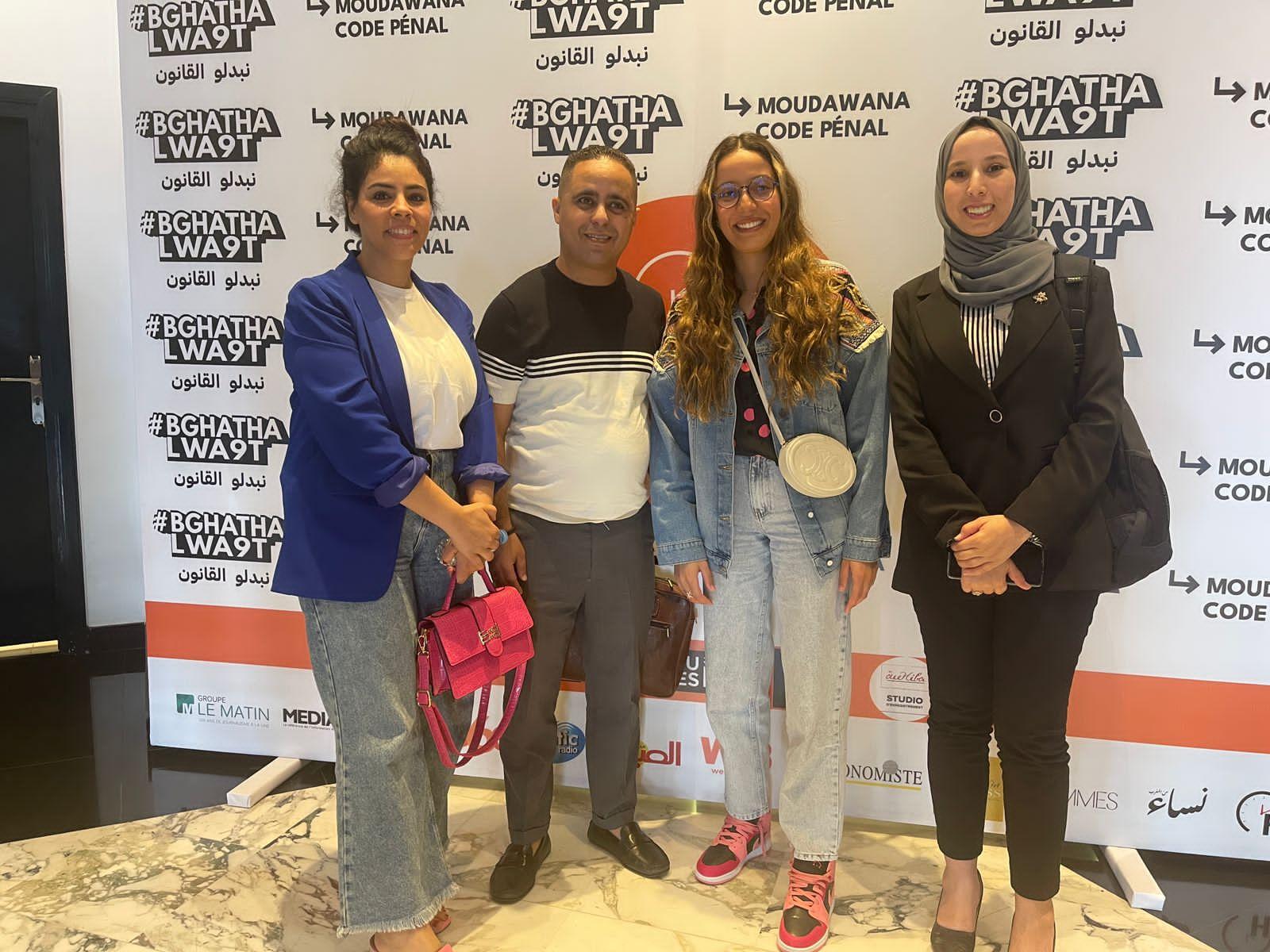
Maroc : Favoriser les synergies pour une meilleure prise en charge des femmes victimes de violence
Meriem HILALI | 17/05/2023
Au cours des dernières semaines, le projet belgo-marocain d'appui aux services de sécurité sur la thématique de la lutte contre les violences faites aux femmes "ASSVFF" a pris part à plusieurs évènements en lien avec la thématique du #Genre à savoir :✅ Atelier de sensibilisation et simulation d’un procès fictif à la lutte contre la violence à l’égard des femmes et la violence domestique, coorganisé par le Conseil de l’Europe et la Clinique de Droit, Université Mohamed V de Rabat, le 17 avril 2023 à #Rabat. ✅ Vernissage de l’exposition sur la broderie marocaine à la rencontre les broderies du monde sous le thème « Femmes et broderie : du savoir-faire ancestral à l’autonomisation » organisé par le Ministère de la Famille, de la Solidarité, de l'Égalité et du Développement Social, en partenariat avec des Ambassades accréditées au Maroc, et ce le 2 mai 2023 à la Galerie d’Art « Espace Expressions CDG » à #Rabat. ✅ Conférence de presse de la campagne « Bghatha lwa9t » en marge de la présentation du rapport analyse genre des lois, organisé par le Comité pour une législation égalitaire, et ONU Femmes, et ce le 2 mai 2023 à #Casablanca. ✅ Séminaire sur le thème « Révision Globale du Code de la famille : pour le renforcement des droits et l’égalité dans la société », coorganisé par le Groupe Socialiste - Opposition Ittihadi en coordination avec l’Association Droits et justice, OFI Maroc et le Collectif Dounia pour l’interdiction du mariage des fillettes, le 3 mai 2023, au Parlement, à #Rabat. ✅ Colloque international sur les Violences de genre : les comprendre, les contrer, coorganisé par la Faculté des Lettres et des Sciences Humaines-Aïn Chock de l’Université Hassan II de Casablanca, le Laboratoire de recherche Genre, Éducation, Littérature et Médias (GELM) et le Centre des Études, de Recherche et de Formation sur le Genre et l’Égalité au Maroc (CEG), les 4 et 5 mai 2023, au sein de la Faculté des Lettres et des Sciences Humaines de Aïn Chock, à #Casablanca ✅ Présentation du Rapport National de la Commission Nationale pour la prise en charge des femmes victimes de violence, organisée par ladite commission, le 9 mai 2023 à #Rabat. La participation de "ASSVFF" avait comme objectif de recueillir les bonnes pratiques, les expériences, et d’échanger sur les obstacles et les leçons tirées avec les différents acteurs actifs sur le sujet de la prise en charge des femmes victimes de violence, ainsi que favoriser des synergies pour une meilleure prise en charge des femmes victimes de violence. À titre de rappel, le projet #ASSVFF est financé par la coopération belge, et mise en œuvre en étroite collaboration par Enabel au Maroc avec le Ministère de l’Intérieur, la DGSN, la Gendarmerie Royale et la Police Fédérale Belge.
-

Academic Management System Innovation Supports School Practice in Uganda
Dorothy KYAMAZIMA | 17/05/2023
For many years, the National Teachers Colleges (NTCs) have faced challenges with record keeping and managing college activities. College data was often lacking or inaccessible. Today, Colleges are using in-house Academic Management software that is improving their digital capacity to manage college services.
-

Students Benefit from Uganda' Emergency Education Response Plan
Dorothy KYAMAZIMA | 17/05/2023
Isaac Amanya is one of the more than 3500 in-service teacher trainers who have benefited from the education Emergency Response Plan in National Teachers’ Colleges implemented by Enabel and the Ministry of Education and Sports during the COVID-19 pandemic.For more click here: ➡️ https://bit.ly/41FCfjz
-

Uganda's Education Response Plan for Teachers' Colleges
Dorothy KYAMAZIMA | 17/05/2023
During the COVID-19 pandemic education across the globe came to a stand still. The effects of this were far reaching and rural areas were hit hardest due to underlying disparities. However, from this education crisis rose the opportunity to enact an emergency response plan that would fast track education service delivery and leave no one behind. Today, more than 3500 students in the National Teachers’ Colleges are benefiting from the education emergency response plan implemented by Enabel and the Ministry of Education and Sports during the COVID-19 pandemic.
-

Uganda: Digitizing School Practice
Dorothy KYAMAZIMA | 17/05/2023
National Teachers’ Colleges have made strides in adapting digital technologies in the Teaching and learning process. Colleges now simplify the school practice process using an inbuilt academic management system. Click here for more: ➡️https://bit.ly/3Bzx7mq
-
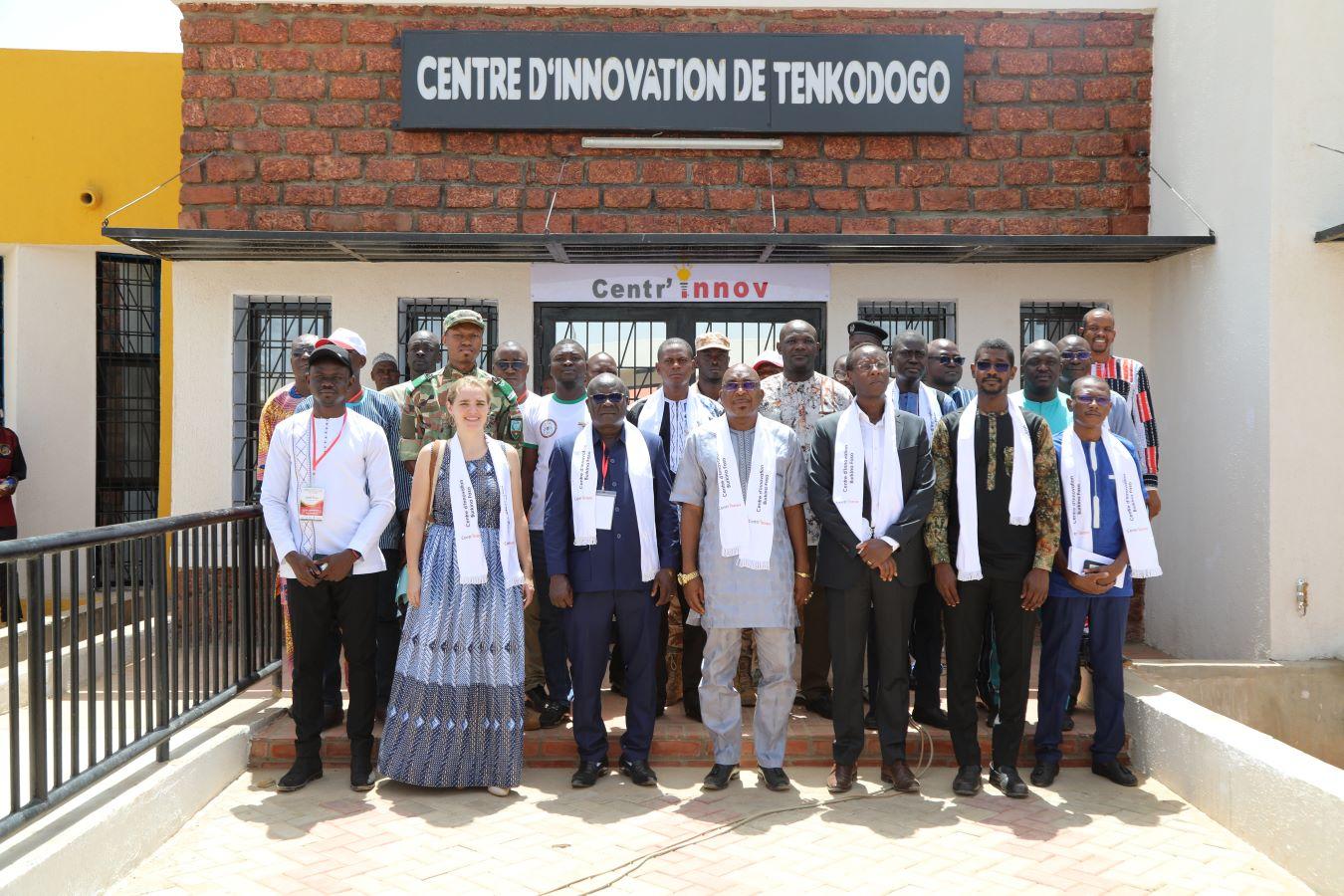
Au Burkina Faso, un centre d’Innovation voit le jour pour le plus grand bonheur des entrepreneurs
Geoffroy ZONGO | 15/05/2023
Enabel, à travers son Intervention Entrepreneuriat, a fourni officiellement un centre d’Innovation à la commune de Tenkodogo. La cérémonie d’inauguration du centre, construit et entièrement équipé par Enabel, a eu lieu le mercredi 10 mai 2023 sous la présidence du colonel Aboudou Karim LAMIZANA, Gouverneur de la région du Centre-Est. La cérémonie a connu la présence effective de Gilbert SINDAYIGAYA, Représentant résident d’Enabel par intérim au Burkina Faso, de Julie VAN DER SMISSEN, Intervention Manager Entrepreneuriat, des autorités administratives, coutumières et religieuses de la Région du Centre-Est et de plusieurs partenaires et acteurs de mise en œuvre des projets financés par Enabel. Le Centre d’Innovation de la région du Centre-Est est bâti sur un terrain de 2100 mètres carrés dans la commune de Tenkodogo. L’infrastructure comporte un espace d’accueil, un espace coworking, une salle de conférence, deux petites salles de réunion, quatre bureaux individuels, une salle dotée d’ordinateurs, une autre salle équipée d’imprimantes 3D, un hangar d’exposition et un espace de rangement des équipements technologiques. Ces espaces sont équipés en mobiliers et matériels pour permettre la tenue des activités dans des conditions optimales. Le Centre dispose également d’une source autonome d’énergie composée de plaques solaires et de batteries permettant de faire fonctionner l’ensemble des équipements électriques, hormis les climatiseurs. L’infrastructure et tous ces équipements sont d’une valeur de plus de 294 millions de FCFA, soit environ 450 000 euros. Stimuler l’innovation et accompagner les porteurs de projet à transformer leurs idées et/ou leurs activités économiques existantes en entreprises viables.Selon Gilbert SINDAYIGAYA, Représentant résident d’Enabel par intérim au Burkina Faso, « La vocation du Centre est d’être un espace d’informations et d’accompagnement sur les technologies, le digital et l’entrepreneuriat avec pour mission principale de stimuler l'innovation en tenant compte des potentialités de la région et accompagner les porteurs de projet à transformer leurs idées en entreprises viables. Il prend ainsi le relais du Centre de Promotion des Technologies qui avait été mis en place en octobre 2020, en capitalisant sur les acquis de celui-ci et en élargissant ses missions. »Le Gouverneur de la région, quant à lui, se réjouit de cette initiative d’Enabel qui traduit une fois de plus la consolidation des relations entre le Burkina Faso et le Royaume de Belgique. « Notre région est à l’honneur par l’inauguration de cette belle infrastructure que je salue à sa juste valeur. C’est une première du genre qui gagnerait à être implémentée dans d’autres localités de notre pays afin de stimuler l’innovation et d’accompagner des porteurs de projets, prioritairement les jeunes et les femmes à transformer leurs idées en entreprises viables. », Colonel Aboudou Karim LAMIZANA. Il a invité les bénéficiaires de ces espaces à en faire un très bon et durable usage pour leurs propres intérêts en tant qu’acteurs socioéconomiques et pour tous ceux qui devront profiter des fruits de leurs créativités et innovations. L’infrastructure est offerte à la mairie de Tenkodogo qui, à son tour la met à la disposition de l’Association Centr’Innov Burkina, chargée de sa gestionAu cours de la cérémonie d’inauguration, le Représentant résident d’Enabel par intérim au Burkina Faso, l’Intervention Manager Entrepreneuriat et le Président de la délégation spéciale de la commune de Tenkodogo ont procédé à la signature de l’acte de donation du bâtiment à la Mairie de Tenkodogo. Par cette signature, Enabel en fait totalement don à la commune. En effet, ladite commune a bien voulu mettre son terrain à la disposition d’Enabel pour la construction de l’infrastructure. Quant à la gestion effective du Centre d’Innovation, elle est confiée à l’Association Centr’Innov Burkina dont les membres fondateurs sont CEAS Burkina et Wakatlab. C’est pourquoi, le Président de la délégation spéciale de Tenkodogo Monsieur POODA Sami Bérenger et le Président du Conseil d’Administration de l’Association, Docteur KONSEIBO Charles Didace ont également signé une convention de mise à disposition. Cette action marque officiellement la remise des clés du Centre à l’Association. « Centr’Innov » est la nouvelle dénomination du Centre qui dispose ainsi d'une nouvelle identité visuelle. Il est fonctionnel et s'est déjà fait connaître dans la région du Centre-Est à travers des activités comme : la promotion de technologies adaptées aux besoins des micro et petites entreprises de la région ; la promotion du digital et des outils numériques ; l'organisation d'événements d'émulation pour les jeunes ; l'incubation des porteurs de projet.
-
Au Burkina Faso, zoom sur l'autonomisation des femmes et des jeunes déplacés dans la région du Centre-Est
Kimsegninga SAVADOGO | 15/05/2023
Ce projet financé par Enabel au Burkina Faso est mis en œuvre par un consortium constitué de trois organisations : TRIAS (organisation belge et chef de fil), ICCO- Coopération ONG néerlandaise) et OCADES (Organisation Catholique pour le Développement et la Solidarité) dans quatre communes (Koupéla, Pouytenga, Bittou et Ouargaye) de la région de Centre-Est. L’équipe du projet, est à pieds d’œuvre sur le terrain pour apporter aux populations vulnérables de la zone d’intervention, un encadrement et un appui technique adéquats à travers notamment : L’identification et l’accompagnement technique de 800 de femmes cheffes de ménages (PDIs et hôtes) dans la mise en œuvre des activités génératrices de revenus (AGRs) à travers le cash transfert ; La formation professionnelle aux métiers au profit de 200 jeunes et femmes des quatre communes concernées par le projet ; L’aménagement de deux sites maraichers et piscicoles à Pouytenga et à Koupéla au profit de 100 femmes dont 50 femmes par site. L’ensemble de ces actions tiennent compte d’un ratio de 70% de personnes déplacées internes (PDI) et de 30% de populations hôtes et 1200 bénéficiaires directs sont cibles directs de ce projet. Un mécanisme endogène d’épargne et de crédits CECA (communauté d’épargne et de crédit autonome) Dans le cadre de ce projet, les femmes sont organisées en groupements de 15 à 25 personnes chacun dénommés CECA qui se réunissent hebdomadairement pour des cotisations volontaires en vue de réunir un capital devant servir de base pour des octrois de crédits aux membres desdits groupements. Il s’agit d’un mécanisme endogène permettant d’autofinancer des petites initiatives d’activités génératrices de revenus mais aussi de subvenir aux besoins urgents notamment les cas de maladies, de scolarité des enfants, etc... Ainsi, le capital constitué permet d’octroyer de crédits entre membres des groupes. Ces crédits sont remboursés avec un petit bénéfice qui permet d’augmenter le capital. Cas du CECA Wendsongda de Pouytenga La Communauté d’Epargne et de Crédit Autonome (CECA) Wendsongda (en français, Dieu aide) de Pouytenga regroupe en son sein 29 femmes toutes PDI en provenance des zones gangrénées par les attaques terroristes à savoir l’Est, le Centre-Nord et le Nord du Burkina Faso. Ces femmes se réunissent une fois par semaine et cotisent au moins à chaque rencontre 250 francs CFA (une part) par personne pour constituer une caisse d’épargne commune. Chaque membre peut cotiser jusqu’à 5 parts ; soit 1 250 FCFA par rencontre. A leur quatrième session tenue le 4 mai 2023, lors du passage d’une équipe d’Enabel au Burkina Faso, elles avaient déjà mobilisé 55 250 francs CFA dans leur caisse avec à côté, un fonds de solidarité de 2500 francs CFA. Ce dernier sert à fournir une assistance en cas des problèmes sociaux que rencontreraient les membres du groupe comme les cas de maladies, de décès, etc. Un comité de gestion composé d’une présidente, d’une secrétaire générale, d’une trésorière, de deux commissaires aux comptes et de trois caissières, veille à la gestion parcimonieuse des fonds collectés qui servent d’épargne et d’octroi des crédits aux membres qui en désirent, suivant des critères définis par le règlement d’ordre intérieur de la caisse. A notre présence, 2 femmes manifestent ce jour-là leur souhait de bénéficier d’un crédit avec lequel la première planifie vendre des légumes et a déjà cotisé 3 500 francs CFA. La seconde souhaite développer son activité de restauration. Elle veut s’approvisionner en pâte d’arachide à cet effet et a aussi cotisé un montant total de 4750 francs CFA. Selon le règlement d’ordre intérieur du groupe, chacune d’elle ne peut prétendre qu’à un crédit maximal équivalant à trois fois la somme qu’elle a déjà cotisée. La première se propose de rembourser le crédit perçu en un seul mois et la seconde remboursera en trois mois le crédit de 15 000 CFA demandés. Chacune d’entre elle est soumise à l’obligation de payer des intérêts fixés à 250 francs CFA par mois sur 5 000 francs CFA empruntés.Les femmes membres du CECA Wendsongda disent se faire mutuellement confiance et engagées à rester en groupement et à poursuivre les activités même après la fin du projet. Activités génératrices de revenus au profit de 800 femmes cheffes de ménages En plus du mécanisme endogène d’épargne et d’octroi de crédits-CDECA, les 800 femmes ont été appuyés par les business coach et les Centre de Ressources en Entreprenariat Rural –CREER dans le développement d’un plan d’affaire personnel dont le montant ne dépasse pas 100,000 FCFA. Pour cela, chacune devra ouvrir individuellement un compte bancaire auprès de l’une des deux structures de microfinances (Coris Bank ou Réseau des Caisses Populaires) par lequel elle recevra un « cash transfert » pour développer une AGR. Cette modalité de transfert a été choisie dans le souci de mettre en relation les bénéficiaires du cash et les institutions financières locales afin de bénéficier de leurs services comme l’épargne et le crédit dans la poursuite de leur AGR. Nous espérons que le cash transfert renforcera les premières initiatives d’épargne et de crédits déjà constatées à travers les CECA mais aussi et surtout permettra le développement des AGRs pour l’ensemble des bénéficiaires directs comme objectif ultime de ce projet. Formations professionnellesLes 200 jeunes ciblés pour cette activité ont été affectés dans 24 structures de formation dont 17 ateliers et 07 centres de formation. Au total, onze corps de métiers dont le tissage, la coupe - couture, la coiffure, la mécanique deux roue, la construction métallique/soudure, la menuiserie, le tricotage, l’électricité, la vulcanologie, la conduite automobile et la cosmétique sont les préférences des apprenants. Le projet procèdera aux paiements des frais d’inscription des apprenant-e-s aux différentes structures de formation, suivant leurs grilles tarifaires et selon le plafond de 150 000 francs CFA fixé à cet effet. Des subventions à des coopératives pour l’acquisition d’équipementsDans le cadre des formations en métiers, il est prévu des subventions à des coopératives pour l’acquisition d’équipements pour l’encadrement et la formation professionnelle dans les métiers choisis par les bénéficiaires. En tout, huit coopératives bénéficieront de subventions dont le plafond est fixé à 1,5 million de francs CFA pour l’acquisition desdits équipements. A cet effet, un comité comprenant les représentant des bénéficiaires, les services techniques, d’entrepreneuriat et les délégations spéciales a déjà fait la présélection qui a permis de retenir 10 coopératives /entreprises sociales. De plus, des structures de formation mises à contribution dans le cadre de ce projet seront dotées en « matières d’œuvre » comme les mannequins pour la couture, les poupées pour la coiffure, etc… suivant l’identification de leurs besoins spécifiques. De plus, ces coopératives offriront aux participants aux formations des opportunités de réinsertion socio-économique. Sécurité foncière pour assurer l’exploitation des sites maraîchers En ce qui concerne l’aménagement des sites maraîchers, des négociations foncières ont été menées et ont permis d’acquérir un hectare de terre à Pouytenga dans le village de Baka et un autre hectare à Koupéla dans le village de Togtenga. Les négociations ont abouti à la cession définitive des terrains concernés aux communes. Ces terrains deviennent désormais des sites à vocation communautaire, exploitables par les coopératives/groupements même après la fin du projet et/ou le retour des PDI. Les accords conclus suite aux négociations seront matérialisés à travers la signature des documents officiels de cession. Les travaux géophysiques de l’eau et les recherches topographiques pour la délimitation des espaces sont aussi en cours. A l’issue de ce processus qui implique à la fois les techniciens des ministères de l’agriculture, de l’environnement, de l’élevage ainsi que des services fonciers ruraux, les bénéficiaires pourront exercer en toute sécurité des activités de maraichage et de pisciculture dans des bassins de 8X5 mètres carrés. Quelques défisParmi les quatre communes couvertes par le projet, deux en l’occurrence Bittou et Ouargaye sont sous emprise des attaques terroristes. Néanmoins, quoique difficilement accessibles, ces communes restent résilientes et les activités de formation se déroulent sans trop de couac. L’administration locale rencontre des difficultés de fonctionnement mais les institutions de microfinance restent fonctionnelles.
-
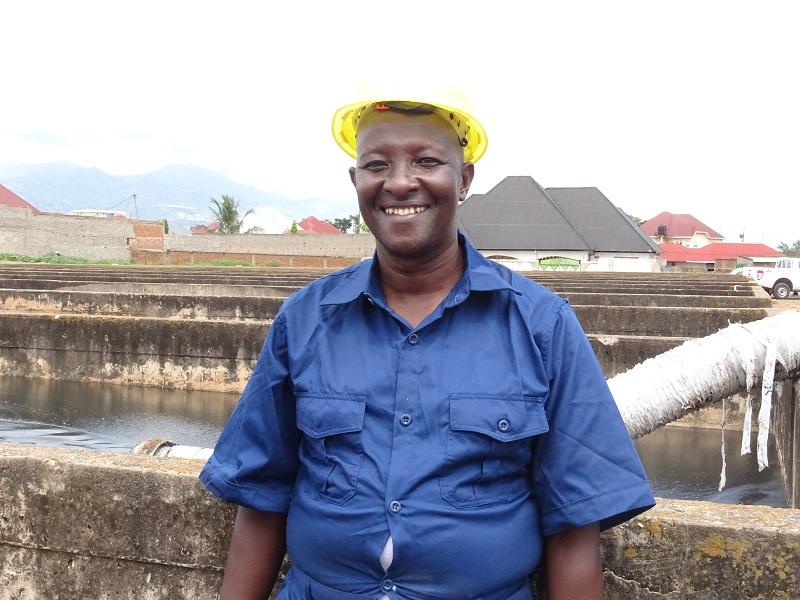
Burundi : Rencontrez Johnny ou le témoin de la métamorphose de la station d’épuration des eaux usées de Buterere
Rodrigue NIYONGABO | 15/05/2023
Johnny, le sage, c’est comme ça qu’on le surnomme. De son vrai nom, c’est Johnny Nduwimana. Il travaille depuis 20 ans à la station d’épuration des eaux usées de Buterere, dans la ville de Bujumbura au Burundi. Ce technicien chevronné a accepté de témoigner sur les changements positifs de la station d’épuration des eaux usées de Buterere après l’appui du projet LATAWAMA mis en œuvre conjointement par Enabel Burundi et l’Autorité du Lac Tanganyika, sur financement de l’Union européenne. Il est 9h du matin à la station de Buterere. L’ambiance est talonnée par le bruit des camions vidangeurs qui se relaient afin d’évacuer les eaux usées en provenance des ménages. De loin, nous apercevons Johnny Nduwimana, la « bibliothèque vivante » de la station. Ce jour-là, il coordonne l’équipe de vidange des boues de la station à l’aide de la pompe automatique financée par le projet LATAWAMA. C’est l’élément du « puzzle » qui manquait à la station d’épuration et qui est venu compléter un paquet d’activité du projet Latawama dont l’objectif est d’optimiser le fonctionnement de la station d’épuration des eaux usées de Buterere. « Je travaille ici depuis de longues années. J’ai été témoin de différents appuis. J’ai assisté à différentes activités de cette station, jamais je n’avais vu une pompe d’une telle performance pouvant nous aider à vider les boues des bassins sur une longueur de 200m linéaire ». Je pense que nous sommes les premiers sur le territoire national à posséder une pompe aussi efficace », dit Johnny. D’une pierre, deux coups ! A côté de l’optimisation du fonctionnement de la station, l’utilisation de cette pompe marque la fin du curage manuel des boues des bassins de la station d’épuration des eaux usées de Buterere, avec toutes les conséquences pouvant en découler. « Avec la nouvelle pompe, nous allons facilement évacuer les boues liquides vers les lits de séchage. Nous espérons valoriser les boues en l’agriculture, le cas échéant et contribuer à l’équilibre financier de la station d’épuration. » Un appui qui donne de l’impact et qui améliore la performance épuratoire de la station.Pour rappel, à Bujumbura, le projet LATAWAMA contribue à optimiser le fonctionnement de la station d’épuration des eaux usées de Buterere.Après la réhabilitation des lits de séchage des boues et du laboratoire d’analyse des eaux, le projet vient de livrer un équipement de pompage des boues d’une capacité de 200 m³ par heure. Cet équipement permet la vidange des boues des bassins de la station et leur traitement au niveau des lits de séchage.Une gestion efficace des boues permet d’améliorer les performances épuratoires de la station et ainsi de garantir que les eaux de rejet de la station ne dégradent pas la qualité des eaux du lac Tanganyika.
-

Au Bénin, Enabel à travers DigiBoost révolutionne l’écosystème de l’économie numérique
Reece-hermine ADANWENON | 15/05/2023
Le projet d’appui au renforcement de l’écosystème de l’économie numérique au Bénin DigiBoost mis en œuvre par Enabel et financé par L'Union Européenne au Bénin était présent à la 2ème édition du SENIA (Salon de l’entrepreneuriat Numérique et de l’Intelligence Artificielle) organisé par le Ministère du Numérique et de la Digitalisation.2 jours durant, les animateurs de nos stands ont présenté notre projet aux participants et visiteurs des stands du SENIA.Pour vous qui n’avez pas pu effectuer le déplacement au Palais des congrès de Cotonou les 11 et 12 mai 2023, nous vous présentons DigiBoost.Le projet DigiBoost vise à renforcer la capacité et la performance des Structures d’Appui à l’Entrepreneuriat Innovant (SAEI), tout en améliorant la qualité des services qu’elles offrent aux startups numériques, et en contribuant à un environnement plus incitatif au Bénin. Avec DigiBoost c’est : - Appui à 36 SAEI sur toute l’étendue du territoire national ;- Contribution à la consolidation d’une Fédération des SAEI Béninoises ;- Mise en place d’1 référentiel d’accompagnement des SAEI avec 10 parcours de renforcement de capacités ; - Mise en place un programme de mobilité au profit des SAEI et de la communauté WIT dans 3 pays : le Sénégal, le Rwanda et la Belgique ;- Création et consolidation de la communauté Women In Tech au Bénin (WIT). Une communauté de femmes professionnelle des métiers du numérique constituée entrepreneurs. Elle compte aujourd’hui plus de 50 membres actif ;- 200 startups impactées sur l’ensemble du territoire béninois à travers les actions des SAEI et évènements de l’écosystème.
-
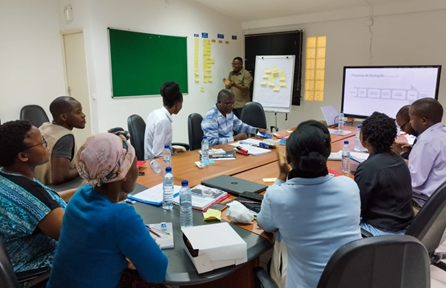
Promoting a ‘Training of Trainers' approach in the energy sector in Mozambique: lessons learned
Akila MUNIR | 15/05/2023
By Esra NURJA and Evert WAETERLOOS, Enabel MozambiqueMozambique is one of the countries most vulnerable to climate change (UNHCR, 2022). In recent years, the country suffered from more frequent and intense extreme weather events such as cyclones, tropical storms and floods. It is against this background that Enabel supports Mozambique in the promotion of sustainable access to renewable energy. As part of this support, Enabel responded to the lack of information dissemination within the different government institutions at central and provincial level, by promoting a Training of Trainer (ToT) methodology within the Ministry of Mineral Resources and Energy (MIREME) and the Energy Regulatory Authority (ARENE). A ToT approach is effective in transferring both technical knowledge and pedagogical competencies to the trainers and trainees. This has the advantage of creating a "cascade effect" of new trainers forming other trainers. An Enabel Junior Expert was assigned to the elaboration and roll-out of such a ToT approach. The priority topics identified to introduce this methodology within MIREME and ARENE were: gender mainstreaming in the promotion of sustainable access to energy, energy data collection and management, and renewable energy technologies.The ToT around gender mainstreaming has been developed and fully implemented. In other words, a ToT manual has been created and 23 Gender Focal Points (GFPs) from different government institutions at central and provincial level, were trained as gender trainers. Three training sessions were organised in 2022; one within the National Institute of Irrigation (INIR), one within the Department of Planification and Cooperation of MIREME, and one in the province of Gaza, within the Provincial Infrastructure Service (SPI).The two other ToTs, around energy data collection and management and renewable energy technologies, were developed but could not be implemented. This means that the training manuals are largely finalised, but have yet to be approved, so no training sessions could be held. This is mainly due to institutional and time constraints, such as difficulties in receiving official data and feedback.This project has brought many lessons learned that can be resumed as follows: first, defining a proper baseline for each target group of trainees is important to better assess their current level of knowledge, and respond more effectively to it. Having mixed target groups is also important to ensure that information reaches end-users more directly. For example, in the case of the ToT around gender mainstreaming, not only training GFPs, but also community leaders may result in a wider and more direct outreach. Secondly, creating a working group is important to facilitate ownership and receive frequent input from the partner institutions. This working group can also help avoid institutional constraints if needed. Therefore, it is important to choose the right people, able to provide frequent and relevant information, and access to relevant contacts. Finally, fostering all kinds of collaboration between different institutions, Enabel projects, national and international junior experts, allows for broader and deeper results, as this stimulates a wider sharing of knowledge and good practices. In this project, two government institutions, part of another Enabel's intervention in Mozambique (RERD2), have benefited from this ToT project by participating in the training sessions, as well as developing and implementing their own training action plan within their institutions, under the supervision of the Enabel Junior Expert. It must be noted, though, that this kind of project can only be successful if sufficient financial and operational resources are allocated.These lessons learned can be used for the improvement of future ToTs, which are foreseen in the new 5-year cooperation portfolio of Belgium with Mozambique. The full capitalisation report can be accessed here: https://www.enabel.be/app/uploads/2023/05/Capitalisation-report-on-training-of-trainers-approach-in-the-renewable-energy-sector-in-Mozambique.pdfPicture 1. Armindo Culeco (INIR) giving a training session to his colleagues of INIR, November 2022. Photo credits: Esra Nurja (Junior Expert at Enabel)
-

Promouvoir la Santé et la Sécurité dans le milieu d’apprentissage professionnel au Burundi
Donavine KWIZERA | 09/05/2023
Enabel à travers le projet ACFPT soutient 18 Centres d’Enseignement des Métiers (CEM) et Centres de Formation Professionnelle (CFP) à travers le pays. Dans ces centres, les jeunes apprentis (âgés de 15-18 ans) apprennent un métier technique et professionnel tel que soudure, menuiserie, électricité, maçonnerie, mécanique automobile, etc. Au total, ce sont 20 métiers qui y sont enseignés avec certification de l’Etat. Depuis 2017, près de 15 000 apprentis ont fréquenté ces centres. Dans les ateliers des centres de formation professionnelle, l’utilisation des équipements et du matériel didactique pour l’apprentissage comporte des risques liés à chaque métier. C’est pourquoi, au cours de son apprentissage, l’apprenant, futur ouvrier, doit aussi acquérir une compétence supplémentaire : la capacité à identifier les risques et les facteurs liés au métier, les techniques de prévention à utiliser en milieu du travail et enfin à porter les Equipements de Protection Individuelle (EPI) pour se protéger contre les risques susceptibles de menacer sa sécurité et sa santé. En 2022, Enabel a distribué plus de 9900 EPI pour 58 ateliers de travail parmi les 18 Centres d’Enseignement des Métiers appuyés. Le projet ACFPT promeut l’amélioration d'un environnement d'apprentissage sûr et salubre à travers un accompagnement des centres dans une démarche de prévention holistique des risques d’accidents du travail et de maladies professionnelles afin que les normes Hygiène Sécurité Environnement soient appliquées dans ces centres.En 2023, 130 formateurs ont été formés aux respects des règles HSE.1référent HSE est également désigné dans chaque centre et a une responsabilité dans le déploiement de la démarche de prévention des risques. Dans les 18 Centres appuyés par Enabel, 1870 apprenants sont sensibilisés et appliquent les consignes de sécurité, le port des EPI, les premiers soins et sont à présent en capacité de faire face aux situations d’urgence.Le chemin est encore long pour assurer une couverture généralisée, aussi bien dans les centres de formation pour les métiers techniques et professionnels, que dans le monde de l’entreprise de manière générale. C’est pour cela que le dialogue public-privé, le dialogue entre les services de l’Etat et les entreprises, le dialogue entre les employeurs et les travailleurs, doit se poursuivre afin de graduellement renforcer et appliquer les normes nationales et internationales en vigueur.
